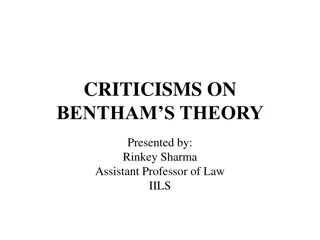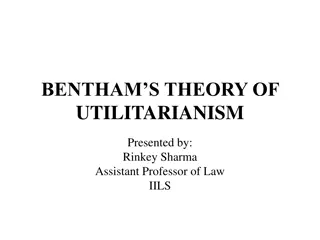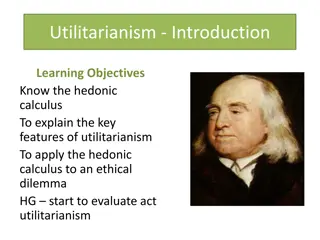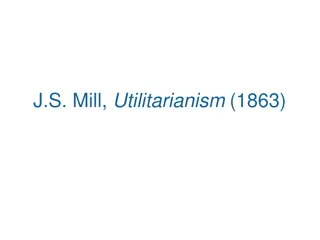Understanding John Stuart Mill's Utilitarianism: Aspects, Criticisms, and Pleasure Categories
Explore the key aspects of Utilitarianism as proposed by John Stuart Mill, including his acceptance of certain principles, criticisms of Bentham's Utilitarianism, and division of pleasures into higher and lower categories. Delve into the complexities of hedonic calculus, weaknesses of act Utilitarianism, and Mill's emphasis on pursuing pleasures that lead to the common good. Gain insights into the concept of higher and lower pleasures and how they impact ethical decision-making.
Download Presentation

Please find below an Image/Link to download the presentation.
The content on the website is provided AS IS for your information and personal use only. It may not be sold, licensed, or shared on other websites without obtaining consent from the author. Download presentation by click this link. If you encounter any issues during the download, it is possible that the publisher has removed the file from their server.
E N D
Presentation Transcript
Utilitarianism John Stuart Mill Learning objectives Know what aspects of Utilitarianism JS Mill accepted Explain what problems Mill had with Bentham s utilitarianism Explain Mill s division of pleasures into higher and lower pleasures
What do the pictures represent? What s missing? Purity Richness R Intensity C Extent Duration
Hedonic Calculus Re-Cap P R R I C E D
Weaknesses of Act Utilitarianism Check pages 14 and 15 of booklet 3 What problems are highlighted by this example? Check you have answered the questions on page 14 in detail Check the extended writing on page 15 Vardy pages 67-68 Some problems
John Stuart Mill Autobiography Born: 1806 (19th Cent) Nationality: British, London Godfather/ influenced by : Jeremy Bentham Ethical Position: Liberal, teleological, utilitarian Famous works: On Liberty, Utilitarianism
What he liked about Benthams work Teleological Principle of utility Strive for equality
What he didnt... Problem with quantifying happiness Mill s murderer example No protection for the minorities sadistic prison guard example Can lead to potentially immoral acts see above
The Common Good JSM believed we should aim for the common good If you had to make a list of pleasures that tend to lead towards the common good what would they be?
Higher / Lower Pleasures It is better to be a human being dissatisfied than a pig satisfied; better to be Socrates dissatisfied than a fool satisfied. Mill s plan was to split pleasure into higher and lower categories He suggested that we then pursue the higher pleasures teleologically aiming for the end/telos This, he argues, would solve the problems of permitting immoral acts It would also give us guidelines about what pleasures we should pursue consequentially
Higher Pleasures Pleasures of the intellect, mind or the spiritual. They help humans to develop their intellect e.g. Literature Plays Music - Beethoven Why did Mill believe that higher pleasures are superior?
Lower Pleasures Those of the Body Inferior pleasures of the body What lower pleasures do you think you can see in these clip? List examples of lower pleasures lower pleasures http://www.youtube.com/watch?v= 39AO2yoPmJg Mill did recognise that we need to first achieve the lower pleasures humans need to eat, sleep, etc. before they can aim for the higher pleasures.
Rule Utilitarianism Believed that rules have a positive contribution to make to utilitarian ethics Believed society should devise and stick to rules which would, in most cases, lead us to the common good. This theory can be split into weak and strong rule utilitarianism
Rule Utilitarianism Strong rule = the person must always stick to the rules which have been devised Weak rule = there may be situations in which the rules can be broken Which one of the above is bordering on deontological? Think of an example to illustrate the difference between strong and weak Utilitarianism
John Stuart Mill summary Read the information and complete the missing words consequences moral rules, judges, intellectual happiness, Bentham, Pain Qu 14 A competent judge, to Mill is one who has experiences of both types of pleasure and when choosing between the pleasures of philosophy and the pleasure of drugs, they will prefer the pleasure of philosophy and therefore it becomes a higher pleasure.
Comparison Task Venn Diagram (or three column table) Vs Quantitative Bentham Mill
Explain Mills Rule Utilitarianism Intro type of theory P 1. Influenced by JB what did he accept? P2. Which JB ideas did he reject? Prison guards P3. How should we judge happiness? Rules P4. Development of Rule Utilitarianism P5. Examples























